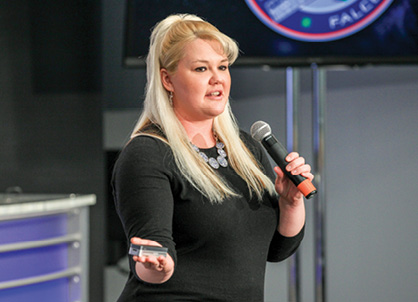 Sounds like science fiction, doesn’t it?
Sounds like science fiction, doesn’t it?
That headline about the photo here, which features WSU biological sciences graduate Sarah Wallace ’05 and, in her outstretched hand, a MinION DNA sequencer, one of which was delivered to the International Space Station (ISS) by an unmanned SpaceX Dragon capsule after being launched aboard the Falcon 9 rocket on July 18.
So why did NASA send a DNA decoder to space? Wallace, who’s a microbiologist at the Johnson Space Center in Texas, explains that the device, a biomolecule sequencer that weighs just 120 grams, will be tested for its effectiveness in evaluating the microbial nature of the ISS environment
and crew.
“This one piece of equipment might do a lot for us, in terms of exploration, research and crew health-related issues,” says Wallace, who is a member of a NASA team that conducts quarterly microbial monitoring of the surfaces and air of the ISS.
The MinION, unlike other DNA sequencers being evaluated for use in space, not only tests in real time for known Earthly organisms, but may be able to analyze samples taken from alien life, such as might be found during NASA’s proposed journey to Mars.





